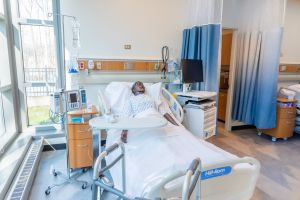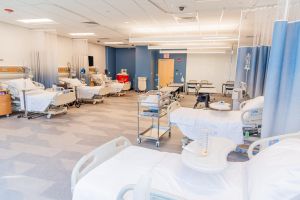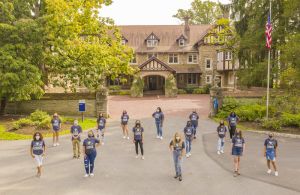
As of fall 2020, Cabrini University established its first Bachelor of Science in Nursing. This program is built to prepare students to provide high-quality care as well as advocate for patient’s rights and health equity.
Upon graduation, Cabrini’s future nurses will be qualified to pass the NCLEX, National Council Licensure Examination. It requires all graduates who want to enter the nursing workforce. The utilization of a state-of-the-art clinical simulation, as well as off-campus experiences, will allow students to become confident in their skills before pursuing their careers. So how is the curriculum of Cabrini’s nursing program able to keep up with a rapidly growing profession?


“We are working with our clinical partners and the recommendations of our key stakeholders in nursing and nursing education to gauge where we should be focusing now and in preparation for the future” Jennifer A. Frey, founding nursing program director, said.
Aligned with Cabrini University values, this program is focused on teaching high-quality patient-centric care, concentrating on addressing and reducing inequities and disparities in the health community. Health disparities refer to systematic inequalities that many communities experience in a medical environment, whether that be as a result of race, sexual orientation, gender identity, financial status, to name a few. Cabrini is educating its nursing students with the tools to develop and learn the skills needed to care for the vastly different communities they will be helping.
“As a person of color, I feel this is a topic that needs to be discussed extensively and especially in our field,” Precious Balogun, sophomore nursing major, said. “I think it is integrated into all of our classes. In a way, everything we learn leads back to the different communities we continue to learn about and how it affects them.”
According to the U.S Bureau of Labor Statistics, the nursing profession is projected to grow nine percent between 2020 and 2030. Although even with approximately 194,500 jobs opening each year, the nursing profession is experiencing massive labor shortages. After almost two years of living with COVID-19, as well as the climbing numbers of the Delta variant cases, it is causing registered nurses to burn out or become sick with COVID-19.
As of 2021 the turnover rate for RNs totals at 18.7 percent projected by Nursing Solutions Inc. 2021 staffing report.
As such “The workforce is changing fast due to COVID-19” Frey, founding nursing program director, said. “The scope of practice for RNs has expanded quite a bit in recent times.”

Along with routine stressors as well as the added pressure of COVID-19, the nursing profession is considered one of the most stressful careers. Many RNs after having worked 10 to 15 hour days do not have adequate time to care for their own health and well being as stated by The Conversation.
Cabrini’s experiential learning and acclaimed science program, combined with a curriculum that is heavily based on social justice as well as leadership, is able to help prepare students for a rigorous career as a registered nurse.
“I feel as though the nursing department is getting us ready to handle what is to come in the workforce that is nursing. It can not truly prepare you for the emotions that flood in when you begin to truly practice nursing” Balogun, sophomore nursing major, said.




